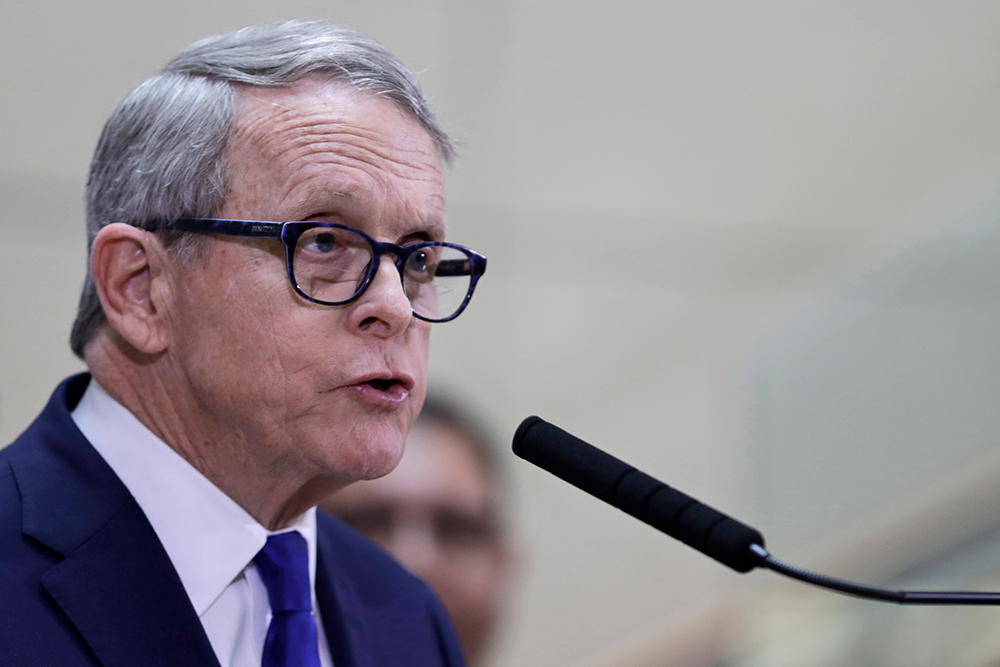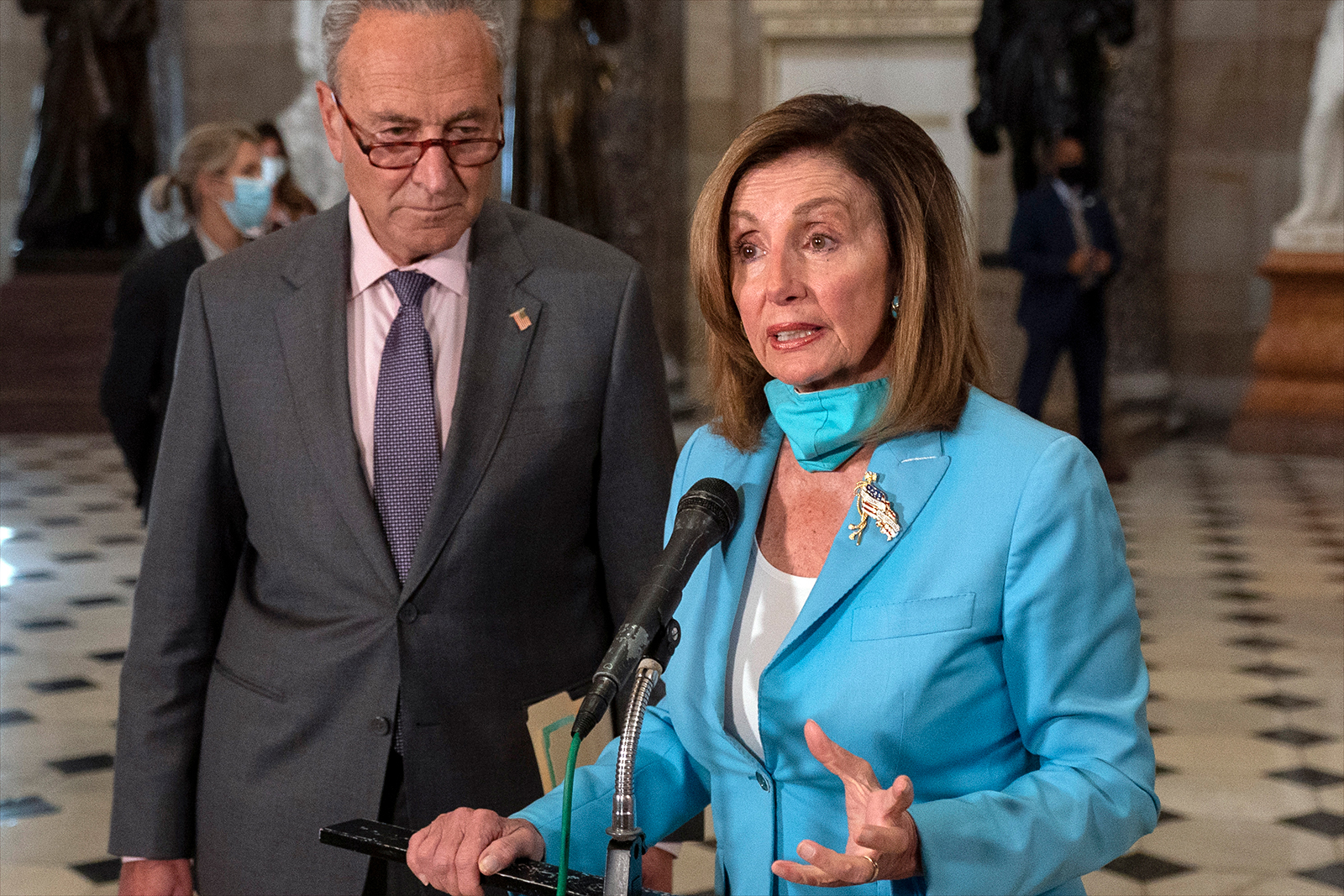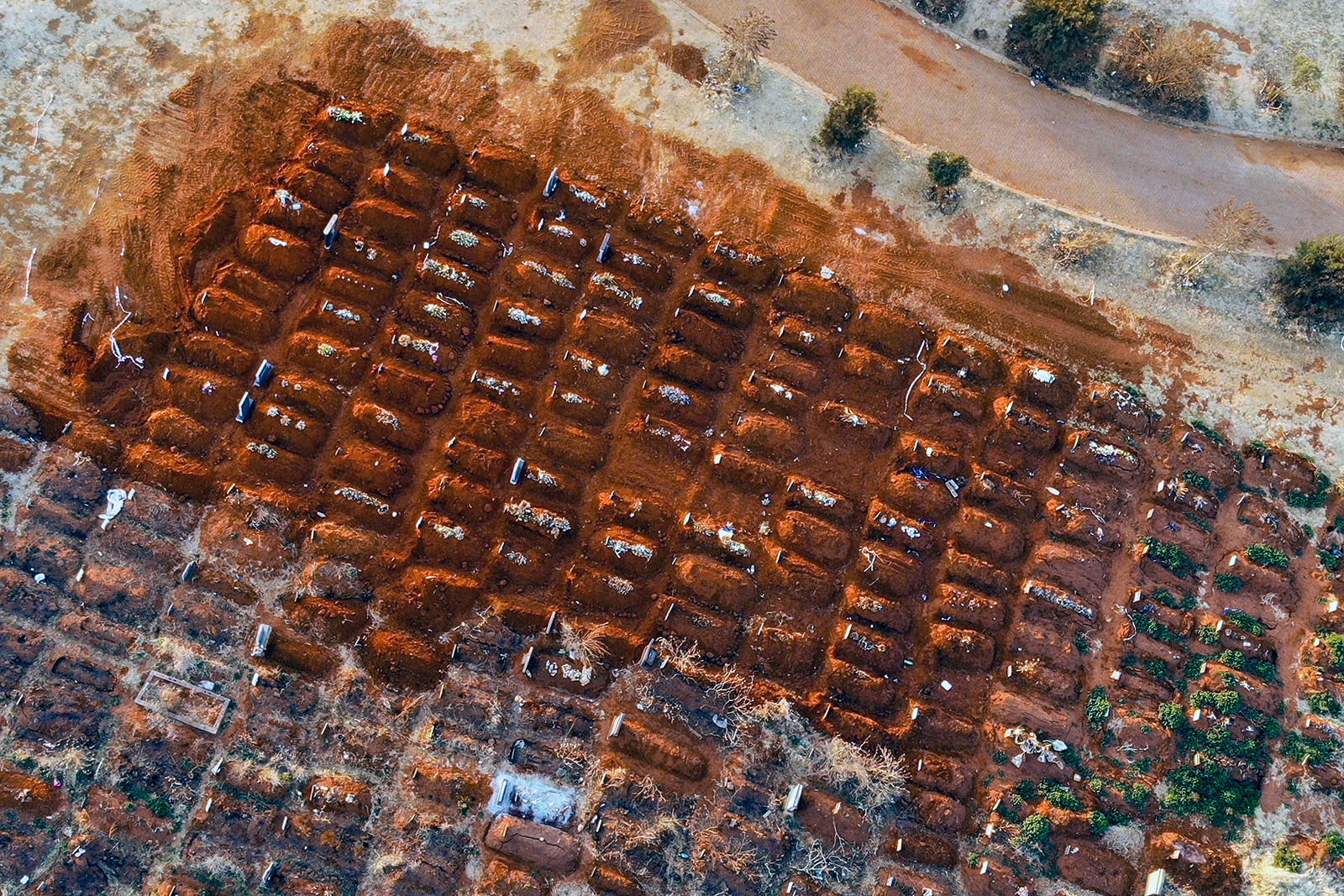Ohio governor tests positive for Covid-19 ahead of meeting Trump
From CNN's Melissa Alonso
 In this file photo, Ohio Governor Mike DeWine speaks at a press conference about the state's preparedness to limit the spread of the coronavirus on Thursday, February 27 in Cleveland. Tony Dejak/AP
In this file photo, Ohio Governor Mike DeWine speaks at a press conference about the state's preparedness to limit the spread of the coronavirus on Thursday, February 27 in Cleveland. Tony Dejak/APOhio Gov. Mike DeWine has tested positive for coronavirus and has no symptoms currently, according to a statement from the governor's office.
DeWine "took a test for Covid-19 as part of the standard protocol to greet President Donald Trump on the tarmac at Burke Lakefront Airport in Cleveland," the statement said.
"Governor DeWine is returning to Columbus where he and First Lady Fran DeWine, who also has no symptoms, will both be tested," according to the statement.
DeWine plans to quarantine in his Cedarville, Ohio, home for the next 14 days, the statement said.
WHO director-general hopes the US will reconsider its withdrawal from the organization
From CNN's Naomi Thomas
Tedros Adhanom Ghebreyesus, director-general of the World Health Organization, said on Thursday that he hopes the US will reconsider its decision to withdraw from WHO – and that the problem the withdrawal creates is not financial, but the lack of solidarity between global leaders.
President Trump announced at the end of May that the US will end its relationship with WHO, the world’s preeminent health organization.
“Now, it’s time to work together. Now, it’s time to focus on fighting the virus. So I hope the US will reconsider its position,” Tedros said during a panel event at the Aspen Security Forum.
Tedros said he has said many times that “you cannot defeat this dangerous enemy in a divided world. We need a united world.”
A united world needs cooperation and solidarity among major powers, he said.
“Multi-lateral organizations can only support, like WHO, the leaders always have been countries, and especially the major ones, who can bring the whole world together,” Tedros said. “So that is more important for WHO, the void, not the financial.”
He said there is still communication between WHO and the US, and that they are working together – but he hopes that the relationship will “return to normal, and a stronger relationship than ever before.”
Tedros said the US has always been known for its generosity, support and leadership in global health. He detailed how during his time as a minister in Ethiopia, while HIV/AIDS was ravaging the continent and the rest of the world, US leadership and generosity gave hope to many.
He also said that if there were problems or issues with WHO or the UN system at large, they would be very open to any evaluations or assessments.
“The truth can be known, and this can be done from inside, without leaving the organization,” he said. “Knowing the truth is very important for the whole world.”
Lessons need to be learned from what is happening and what has happened, Tedros said, and the future needs to be built together.
“If there is any problem, we will find out and we will learn from it,” Tedros said.
Later in the session, Dr. Mike Ryan, director of WHO’s health emergencies program, thanked the United States and the US Centers for Disease Control and Prevention for their continued contribution to global public health.
“The politics of these things will never shake the bonds that scientists have around the world, and the urge and the desire we have to work together to save lives,” he said.
Trump tweets on possible executive action if stimulus deal not reached
From CNN's Jason Hoffman
President Trump tweeted that his staff is working on possible a possible executive order addressing some of the components of the stimulus negotiations.
He tweeted that an executive order could address “Payroll Tax Cut, Eviction Protections, Unemployment Extensions, and Student Loan Repayment Options.”
Some background: The President has repeatedly said he may address these issues through executive action and White House chief of staff Mark Meadows said that could happen if a deal can’t be reached by Friday.
But as CNN's Phil Mattingly has reported, lawmakers on Capitol Hill haven't been taking the threat of executive action seriously for a couple of reasons:
CDC's coronavirus forecast now projects more than 181,000 US deaths by August 29
From CNN's Ben Tinker
An ensemble forecast published by the US Centers for Disease Control and Prevention now projects more than 181,000 coronavirus deaths in the United States by Aug. 29.
The new projections, published Thursday, forecast 181,031 deaths by Aug. 29, with a possible range of 174,946 to 189,433 deaths.
“State-level ensemble forecasts predict that the number of reported new deaths per week may increase over the next four weeks in Hawaii and Puerto Rico and may decrease in Florida, Mississippi, New Mexico, the Northern Mariana Islands, Ohio, Texas, Vermont, and the Virgin Islands.” the CDC says on its forecasting website.
Unlike some individual models, the CDC’s ensemble forecast only offers projections about a month into the future.
The previous ensemble forecast, published July 31, projected roughly 173,000 coronavirus deaths by Aug. 22.
At least 158,445 people have already died from Covid-19 in the United States, according to data compiled by Johns Hopkins University.
Fauci says he would like to get Covid-19 vaccine as quickly as ethically possible
From CNN's Health Gisela Crespo
Dr. Anthony Fauci, director of the National Institute of Allergy and Infectious Diseases, said he would like to get a Covid-19 vaccine as quickly as possible – and according to ethical principles.
"When the vaccine becomes available after a 30,000-person-or-more placebo-controlled randomized trial, and it's shown to be safe and effective, I would get it any time within the timeframe of the people who prioritize it according to ethical principles," Fauci said during an interview on the POLITICO Pulse Check podcast published Thursday.
Fauci explained that while he is in the high-risk group because of his age, "There may be people who need it more than I do, and I would prefer they get it if they need it. I would like to get it as soon as the prioritization by ethical considerations says I can do it."
Later in the interview, Fauci said he would like to stay healthy. "One, I just like being alive and well. And number two, I do have a very deep commitment to ending this pandemic," he told POLITICO's Dan Diamond.
South Dakota medical association president has concerns about the state's big motorcycle rally
From CNN's Adrienne Vogt
 City of Sturgis
City of SturgisThe president of the South Dakota State Medical Association says he is “concerned” about the upcoming City of Sturgis Motorcycle Rally.
About 500,000 people are estimated to have attended the rally last year, and the city’s mayor said there won’t be mask requirements or travel restrictions for out-of state visitors this year.
Dr. Benjamin Aaker said he is “concerned that there is a risk of transmission that people can have if they don’t take the proper precautions.”
People who have pre-existing conditions should consider staying home, Aaker said in an interview with CNN’s Kate Bolduan, and those who do decide to attend should be wearing masks and washing their hands.
Pelosi rejects possibility of short-term extension of federal jobless benefits
From CNN's Ali Zaslav, Clare Forna, Manu Raju and Ian Sloan
 House Speaker Nancy Pelosi of Calif., joined by Senate Minority Leader Sen. Chuck Schumer of N.Y., speaks to media on Capitol Hill in Washington, on Wednesday, August 5. Carolyn Kaster/AP
House Speaker Nancy Pelosi of Calif., joined by Senate Minority Leader Sen. Chuck Schumer of N.Y., speaks to media on Capitol Hill in Washington, on Wednesday, August 5. Carolyn Kaster/APHouse Speaker Nancy Pelosi rejected the possibility of a short-term extension of federal jobless benefits during her news conference on Thursday as stimulus negotiations remain in need of a breakthrough.
What this means: Restoring federal benefits will be contingent on the White House and Democrats cutting a broader deal, which so far remains elusive with White House chief of staff saying recently that the two sides are “trillions of dollars apart.”
Pelosi sounded skeptical and dismissive when a reporter asked about possibility that President Trump could take executive action if there’s no stimulus deal with lawmakers.
“And what is he going to act upon?” Pelosi asked. “I don’t think they know what they’re talking about. The one thing the President can do is extend the moratorium and that would be a good thing if there’s money to go with it and that’s what we keep telling them.”
Pelosi was later asked if thinks the administration could move money around without congressional approval.
“They can’t move that much money, we’re talking about a major investment,” she said.
Asked if Democrats rejected a GOP offer for $400 per week in enhanced federal unemployment benefits, Pelosi responded, “We have said that we are going to have the $600.” She added, “They know that we want the $600.”
“Why dismantle a program that almost all economists say is working and put something new in its place that will take months to go into effect?” Schumer asked.
Pelosi again said she sees a “light at the end of the tunnel.” But she warned, “we have to move quickly, more quickly because that light at the end of the tunnel may be a freight train of the virus coming at us. If we do not act to contain it.”
“As you can see the Democrats in the Congress are unified,” she said, “At the same time, Republicans are in disarray.”
This Texas county extended its shelter-at-home order for another 2 weeks
From CNN’s Kay Jones
The shelter-at-home order in Hidalgo County, Texas, has been extended another two weeks, according to a press release from the Hidalgo County Judge Richard Cortez.
Cortez issued the initial order on July 20, and it went into effect on July 22. The order said it was necessary because of the rise in numbers and fatalities. It was slated to expire at 11:59 p.m. last night, but will now expire at 11:59 p.m. Aug. 19.
The order states that residents should shelter at home, limit their travel, and wear a face covering in public.
There are 18,699 Covid-19 positive cases in the county, which includes the city of McAllen, according to Cortez. At least 450 of those were new as of Wednesday afternoon.
Note: These numbers were released by the Hidalgo County of Texas and may not line up exactly in real time with CNN’s database, which is drawn from Johns Hopkins University and the Covid Tracking Project
WHO warns of lack of testing in Africa as continent approaches 1 million cases
From CNN's Bethlehem Feleke in Nairobi
 Recently filled graves are seen in the Olifantsveil Cemetery outside Johannesburg, South Africa, on Wednesday Aug. 5. Jerome Delay/AP
Recently filled graves are seen in the Olifantsveil Cemetery outside Johannesburg, South Africa, on Wednesday Aug. 5. Jerome Delay/APAs Africa approaches 1 million confirmed Covid-19 cases, representing 5% of global cases, testing in many African countries remains a "constant and concerning challenge," the World Health Organization Regional Director for Africa, Dr. Matshidiso Moeti, said in a news conference on Thursday.
"At the same time, some countries have increased their testing per capita while maintaining a low positivity rate. Countries such as Mauritius, Rwanda, Cape Verde and Botswana," Dr. Moeti added.
WHO reported that July has seen a 40% increase in the total number of tests performed on the continent compared to the previous month.
Meanwhile, 10 countries accounted for 89% of new cases within the past two weeks, WHO said.
Testing assistance: WHO will send technical experts to 11 countries that are experiencing a surge in Covid-19 cases and deaths to assist in "beefing up community engagement and health education and providing direct material support to strengthen testing capacity," according to a Thursday press release.
More than 40 regional experts will be deployed to South Africa, which remains the worst-hit country on the continent and the fifth-worst affected country globally.
The experts will deploy to several of the most severely affected provinces to support the management in areas of epidemiology, surveillance, and rapid data analysis due to a "need for better capacity at the local level, at the district level and in provinces," Dr. Moeti said.
WHO stressed the need for communication surrounding Covid-19 guidelines in African countries to be less centralized and more localized to ensure the messages reach more people in order to contain the outbreak.
16 countries in the region have seen an increase in new cases by more than 20% in the past two weeks compared to the previous two weeks. However, a number of African countries have seen a recent decline in daily cases, with about 20% fewer reported last week than the week before, Dr. Moeti said.
The countries experiencing a decline include: South Africa, Nigeria, Ivory Coast, Cameroon, Republic of Congo, Mauritania, Democratic Republic of Congo, Central African Republic, Botswana, Liberia and Benin.
"We do have countries where despite the fact that the governments did a relaxation of the measures, there was an initial increase in cases and several of these countries now we are starting to see a decline," she added, "The take-home is that we need to monitor this and ensure this decline continues and it's sustained."
Latest figures: So far, 41 countries in the region have reported infections of healthcare workers, indicating about 35,000 have been infected, with the majority in South Africa where about 24,000 healthcare workers have been infected, according to Dr. Moeti.
With 992,710 reported cases and 21,617 deaths, according to Africa Centres for Disease Control and Prevention, the continent is expected to reach the 1 million mark for confirmed cases this week.

 5 years ago
540
5 years ago
540 

